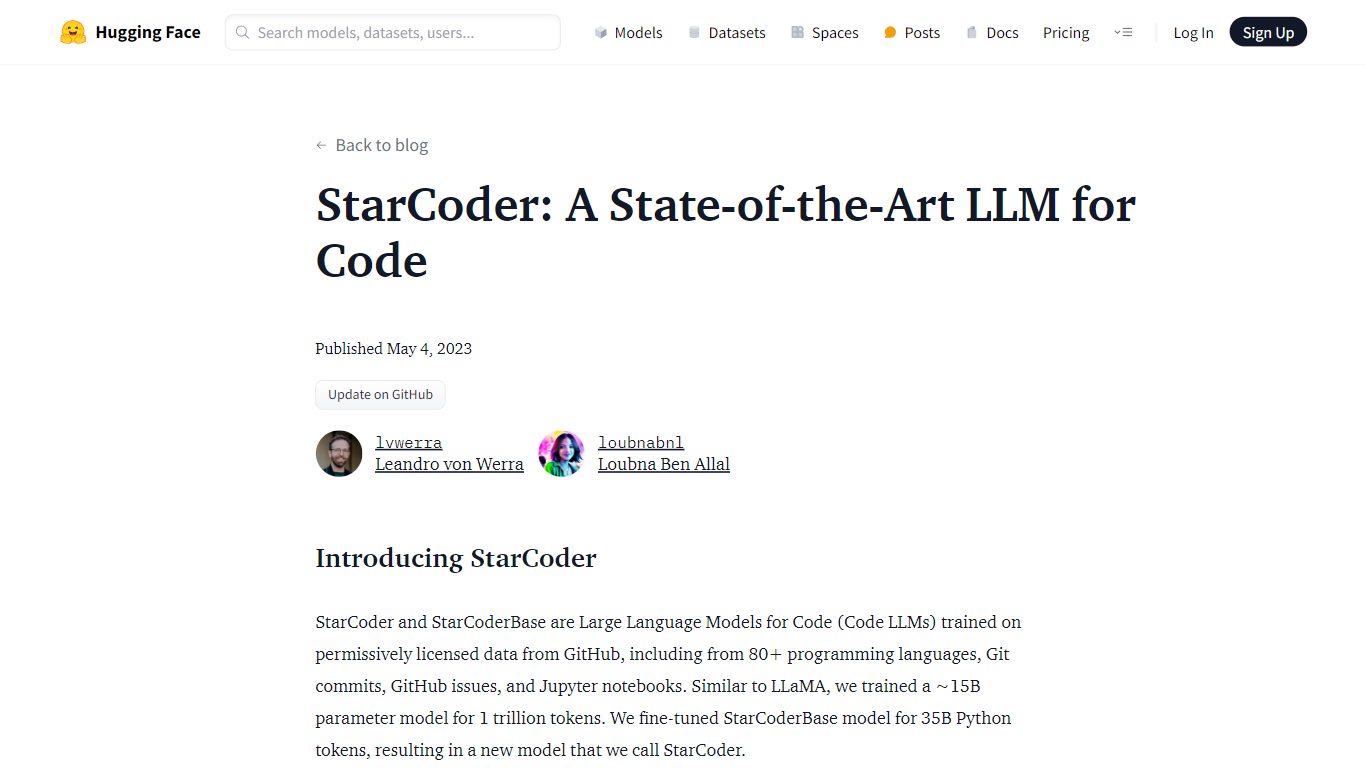StarCoder vs ggml.ai
In the clash of StarCoder vs ggml.ai, which AI Large Language Model (LLM) tool emerges victorious? We assess reviews, pricing, alternatives, features, upvotes, and more.
When we put StarCoder and ggml.ai head to head, which one emerges as the victor?
Let's take a closer look at StarCoder and ggml.ai, both of which are AI-driven large language model (llm) tools, and see what sets them apart. Both tools are equally favored, as indicated by the identical upvote count. Be a part of the decision-making process. Your vote could determine the winner.
Not your cup of tea? Upvote your preferred tool and stir things up!
StarCoder

What is StarCoder?
StarCoder is an innovative Large Language Model for Code (Code LLM) presented by Hugging Face, designed to revolutionize the way we work with programming languages. Trained on an extensive range of permissively licensed data gathered from GitHub, StarCoder understands and processes over 80 programming languages, Git commits, GitHub issues, and Jupyter notebooks. With its ~15B parameter model, StarsCoder is fine-tuned using 35B Python tokens, delivering unparalleled code completion, modification, and explanation capabilities. The model notably demonstrates superior performance in benchmarks against other open-source and proprietary Code LLMs like OpenAI's CodeX. StarCoder's advanced features include an extensive context length, the ability to function as a sophisticated technical assistant, and the promise of safe use through measures like PII redaction and novel attribution tracing. Additionally, StarCoder is being made accessible under the OpenRAIL license, encouraging widespread integration and adaptation to suit a variety of company products and community projects.
ggml.ai

What is ggml.ai?
ggml.ai is at the forefront of AI technology, bringing powerful machine learning capabilities directly to the edge with its innovative tensor library. Built for large model support and high performance on common hardware platforms, ggml.ai enables developers to implement advanced AI algorithms without the need for specialized equipment. The platform, written in the efficient C programming language, offers 16-bit float and integer quantization support, along with automatic differentiation and various built-in optimization algorithms like ADAM and L-BFGS. It boasts optimized performance for Apple Silicon and leverages AVX/AVX2 intrinsics on x86 architectures. Web-based applications can also exploit its capabilities via WebAssembly and WASM SIMD support. With its zero runtime memory allocations and absence of third-party dependencies, ggml.ai presents a minimal and efficient solution for on-device inference.
Projects like whisper.cpp and llama.cpp demonstrate the high-performance inference capabilities of ggml.ai, with whisper.cpp providing speech-to-text solutions and llama.cpp focusing on efficient inference of Meta's LLaMA large language model. Moreover, the company welcomes contributions to its codebase and supports an open-core development model through the MIT license. As ggml.ai continues to expand, it seeks talented full-time developers with a shared vision for on-device inference to join their team.
Designed to push the envelope of AI at the edge, ggml.ai is a testament to the spirit of play and innovation in the AI community.
StarCoder Upvotes
ggml.ai Upvotes
StarCoder Top Features
Multilingual Support: Capable of understanding and processing over 80 programming languages.
Advanced Code Completion: Offers high performance in benchmarks, outpacing other large models like PaLM and LaMDA.
Extensive Context Length: Can handle over 8,000 tokens, allowing for complex input and diverse applications.
Technical Assistant Capabilities: With prompt-based interaction, the model can act as a technical assistant to respond to programming related queries.
Safe and Open Accessible: Introduced with safety measures like PII redaction and an improved OpenRAIL license for ease of integration.
ggml.ai Top Features
Written in C: Ensures high performance and compatibility across a range of platforms.
Optimization for Apple Silicon: Delivers efficient processing and lower latency on Apple devices.
Support for WebAssembly and WASM SIMD: Facilitates web applications to utilize machine learning capabilities.
No Third-Party Dependencies: Makes for an uncluttered codebase and convenient deployment.
Guided Language Output Support: Enhances human-computer interaction with more intuitive AI-generated responses.
StarCoder Category
- Large Language Model (LLM)
ggml.ai Category
- Large Language Model (LLM)
StarCoder Pricing Type
- Freemium
ggml.ai Pricing Type
- Freemium
